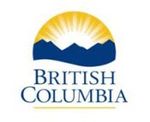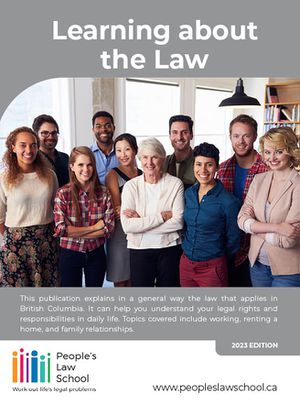Difference between revisions of "About Learning about the Law"
| Line 1: | Line 1: | ||
{{Learning about the Law Wikibook TOC}} | {{Learning about the Law Wikibook TOC}} | ||
This | This publication from People's Law School explains in a general way the law that applies in British Columbia and in Canada. It can help you understand your legal rights and responsibilities under the law. | ||
We tried to keep the language easy, but some parts may still be hard. | We tried to keep the language easy, but some parts may still be hard. Most words in bold are defined in the section [[What the Words Mean in Learning about the Law|What the Words Mean]]. | ||
This publication explains in a general way the law that applies in British Columbia, Canada. It is not intended as legal advice. For help with a specific legal problem, contact a legal professional. Some sources of legal help are highlighted in the [[Find Out More in Learning about the Law|Find Out More]] section. | |||
{| | {| | ||
| Line 17: | Line 12: | ||
== Acknowledgements == | == Acknowledgements == | ||
Contributors to this edition of Learning about the Law: | |||
Writing, editing and legal review: Manjeet K. Chana, Drew Jackson, Spencer Keene | |||
Support: Elena Renderos-Vasquez | |||
The People's Law School acknowledges the contribution of the [https://justiceeducation.ca/ Justice Education Society] in earlier versions of this publication, as well as the contributions of many writers and reviewers. | |||
This publication was made possible through the funding support of the Law Foundation of BC, the Notary Foundation of BC, the Department of Justice Canada, and the Province of British Columbia. | |||
[[File:Canadafederalgovernmentlogo.jpg|frameless|link=|150px]] [[File:BCgovernmentlogo.jpg|frameless|link=|150px]] | [[File:Canadafederalgovernmentlogo.jpg|frameless|link=|150px]] [[File:BCgovernmentlogo.jpg|frameless|link=|150px]] | ||
Revision as of 03:14, 22 April 2022
This publication from People's Law School explains in a general way the law that applies in British Columbia and in Canada. It can help you understand your legal rights and responsibilities under the law.
We tried to keep the language easy, but some parts may still be hard. Most words in bold are defined in the section What the Words Mean.
This publication explains in a general way the law that applies in British Columbia, Canada. It is not intended as legal advice. For help with a specific legal problem, contact a legal professional. Some sources of legal help are highlighted in the Find Out More section.
Acknowledgements
Contributors to this edition of Learning about the Law: Writing, editing and legal review: Manjeet K. Chana, Drew Jackson, Spencer Keene Support: Elena Renderos-Vasquez
The People's Law School acknowledges the contribution of the Justice Education Society in earlier versions of this publication, as well as the contributions of many writers and reviewers.
This publication was made possible through the funding support of the Law Foundation of BC, the Notary Foundation of BC, the Department of Justice Canada, and the Province of British Columbia.

 This project is made possible through funding from the Government of Canada and the Province of British Columbia.
This project is made possible through funding from the Government of Canada and the Province of British Columbia.
For more information on learning about the law, public legal education events or referral services, visit publiclegaled.bc.ca or contact contact the People's Law School at 604-331-5400.
The People’s Law School operates with an annual budget to keep publications up-to-date. Booklets are available in print and online formats as funding permits. Please check our website for resource availability.
The responsibility for using and interpreting this information is with the user.
The People's Law School
The People's Law School is a non-profit charitable society whose purpose is to provide British Columbians with reliable information about their rights and responsibilities under the law.

- 1433 - 1130 W Pender Street
- Vancouver, BC V6E 4E4
- 604-331-5400
- info@peopleslawschool.ca
- www.peopleslawschool.ca
| |||||||||||||||||||||||||||||

